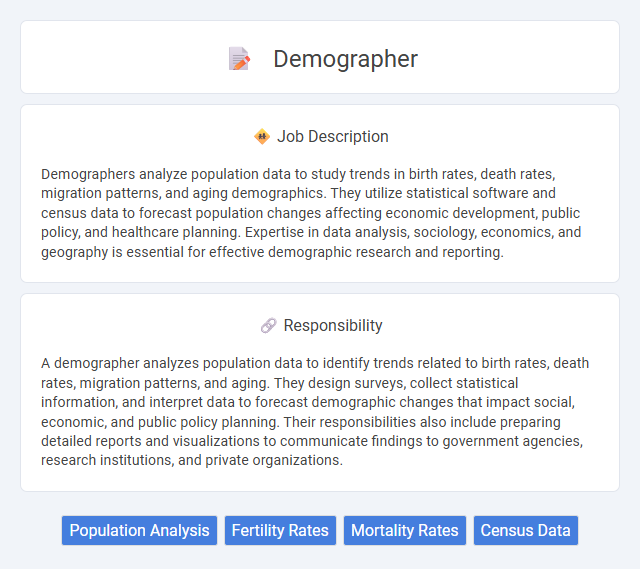
Demographers analyze population data to study trends in birth rates, death rates, migration patterns, and aging demographics. They utilize statistical software and census data to forecast population changes affecting economic development, public policy, and healthcare planning. Expertise in data analysis, sociology, economics, and geography is essential for effective demographic research and reporting.
Demographer roles may suit individuals with strong analytical skills and a keen interest in population trends and social statistics. People who enjoy working with data, conducting research, and interpreting complex demographic information might find this career fulfilling. Those who prefer dynamic, people-oriented environments could find the job less suitable due to its focus on data analysis and reporting.
Qualification
Demographers typically require a bachelor's degree in demography, sociology, statistics, or a related field, with many positions favoring a master's or doctoral degree for advanced research roles. Proficiency in statistical software such as SPSS, SAS, or R is essential for analyzing population data and trends. Strong analytical skills combined with knowledge of population dynamics, fertility, mortality, and migration patterns are critical qualifications for success in this field.
Responsibility
A demographer analyzes population data to identify trends related to birth rates, death rates, migration patterns, and aging. They design surveys, collect statistical information, and interpret data to forecast demographic changes that impact social, economic, and public policy planning. Their responsibilities also include preparing detailed reports and visualizations to communicate findings to government agencies, research institutions, and private organizations.
Benefit
A demographer likely benefits from strong analytical skills that allow for accurate population trend predictions useful in policy making and business strategies. The role probably offers opportunities to work with diverse data sets, enhancing expertise in statistics and social sciences. Job stability and potential for impact on public health, urban planning, and economic development might be significant advantages of this career.
Challenge
Demographer jobs likely involve analyzing complex population data that often presents interpretative challenges due to incomplete or rapidly changing information. They may encounter difficulty projecting future demographic trends accurately amidst unpredictable social, economic, and environmental factors. The role probably demands strong analytical skills to manage data inconsistencies and uncertainty effectively.
Career Advancement
Demographers leverage statistical analysis and social data to forecast population trends, influencing public policy and business strategies. Career advancement often involves specialization in areas such as epidemiology, urban planning, or market research, enhancing expertise and marketability. Senior roles include demographic analyst, research director, or policy advisor, requiring advanced degrees and proven analytical skills.
Key Terms
Population Analysis
Demographers analyze population data to identify trends in birth rates, death rates, migration patterns, and age distribution, providing crucial insights for government planning and policy development. They use statistical software and demographic models to forecast population changes and assess the impact on healthcare, education, and social services. Expertise in census data interpretation and socioeconomic variables enhances their ability to advise on urban development and resource allocation.
Fertility Rates
Demographers specializing in fertility rates analyze birth data to understand population growth trends and inform public policy. They use statistical models to evaluate factors influencing fertility, such as socioeconomic status, education, and healthcare access. Their research helps governments and organizations plan for future demographic changes and allocate resources effectively.
Mortality Rates
Demographers specializing in mortality rates analyze statistical data to understand patterns and causes of death within populations. They utilize life tables, survival analysis, and epidemiological methods to forecast mortality trends and assess public health interventions. Their research supports policy-making processes aimed at improving healthcare systems and reducing premature deaths.
Census Data
Demographers specializing in census data analyze population statistics to identify trends in birth rates, migration, and mortality. They utilize large datasets from national censuses to forecast demographic changes that impact public policy, urban planning, and resource allocation. Expertise in statistical software and demographic methods is essential for accurate interpretation and reporting of census findings.
 kuljobs.com
kuljobs.com